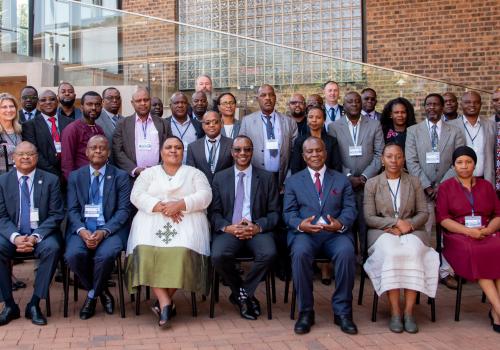The regional policy dialogue convened to discuss interventions that are necessary to build sustainable agri-food systems in the Southern African Development Community (SADC) Region has come up with key recommendations on the importance of trade, policy and investment in facilitating sustainable and resilient agri-food systems.
The dialogue has recommended that SADC and national governments should strengthen efforts to dismantle barriers to trade, enhance the participation of women and youths in agricultural value chains, strengthen the functioning of national agricultural research and development services through technology and soil health and fertility to deliver a strong and improved agrifood system.
The dialogue was convened at the University of Pretoria (UP), in South Africa, from the 29th to 30th August 2022 by SADC in collaboration with the Alliance for African Partnership (AAP) and Regional Network of Agricultural Policy Research Institutes (ReNAPRI), a member of AAP, to discuss options for collective action on the transition towards sustainable and climate-resilient agri-food systems for enhanced food security, ending hunger, and achieving climate objectives in the SADC Region.
The SADC-AAP Dialogue was attended by researchers mainly from across SADC and Africa, government officials and other key stakeholders involved in agri-food-systems in the SADC Region to discuss collective actions on the agri-food systems; the activities and institutions around the production, processing, distribution, marketing, and consumption of food, and the demand and changing dietary preferences in the face of climate and economic shocks.
The dialogue recognised that the Region is undergoing a turbulent time owing to shocks that are straining agricultural and food systems, including inflation and rising fuel, inputs and food prices. External shocks have brought hardships and destroyed livelihoods and this presents opportunities for SADC Members States to build resilient food systems and promote agri-based economic growth.
During the opening session, Honourable Thoko Didiza, Minister of Agriculture, Land Reform and Rural Development of the Republic of South Africa, said that the dialogue was appropriate as the COVID-19 pandemic and the conflict in the Black Sea had brought about health and macro-economic risks to the African continent. The global food system needed urgent intervention from the African governments, the private sector, and various stakeholders to increase investment and spending in research and development, infrastructure, improved land governance, support to private sector investments and the effectiveness of the African Continental Free Trade Agreement (AfCFTA).
The required capacity includes the science and technology institutions and policy frameworks to build resilient food systems that provide healthy diets, build wealth for all and preserve the environment. Sustainable agri-food systems transformation would require interventions on food security, nutrition and health; socio-economics; territorial development and equity; and environmental sustainability.
The dialogue noted that sustainable and resilient agri-food systems should promote diversification of agricultural production, adopt climate-smart agricultural practices, offer incentives for rural investment through the provision of basic services and infrastructure, particularly in rural areas, promote nutrition-sensitive agriculture, create awareness about the consumption of healthy foods and improving availability of nutrition information and education as well as to create decent employment and entrepreneurship in opportunities for youth and women in agriculture.
The dialogue was also meant to prepare SADC Member States for the upcoming 2023 African Fertilizer and Soil Health Summit in order to have a regional collective voice on issues of soil health in SADC. In Africa, soils are poor due to their geological age, lack of volcanic rejuvenation exacerbated by weathering and erosion. Despite this, consumption of fertilizer per capita is five times lower than in Asia and other parts of the world and crop yields have stagnated in the last 50 years, further contributing to food insecurity.
According to the experts who convened in Pretoria, to promote better soil and fertility management in the SADC region there should be use of soil maps to promote efficient use of fertilizers, and establishment of national soil databases where they do not exist; creating enabling policy and regulatory environments to improve access of smallholder farmers to input finance, specifically to fertilizers; and invest in alternative soil fertility management such as soil organic matter addition, use of nitrogen fixers, biofertilizers, bio-stimulants, and crop diversification.
Governments, research institutions, and universities in the Region were challenged to work closely with SADC in defining robust pathways including facilitation of innovative regional interventions that will fast track realization of SADC’s Regional Indicative Strategic Development Plan (RISDP 2020-2030) and SADC Vision 2050 goals which will deepen Southern Africa regional integration and foster development.

